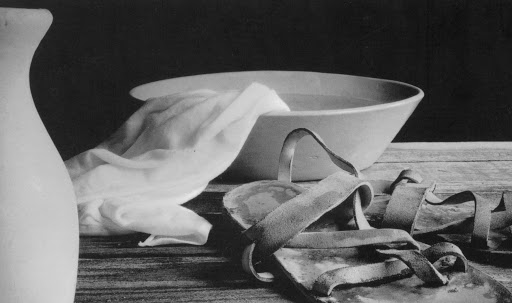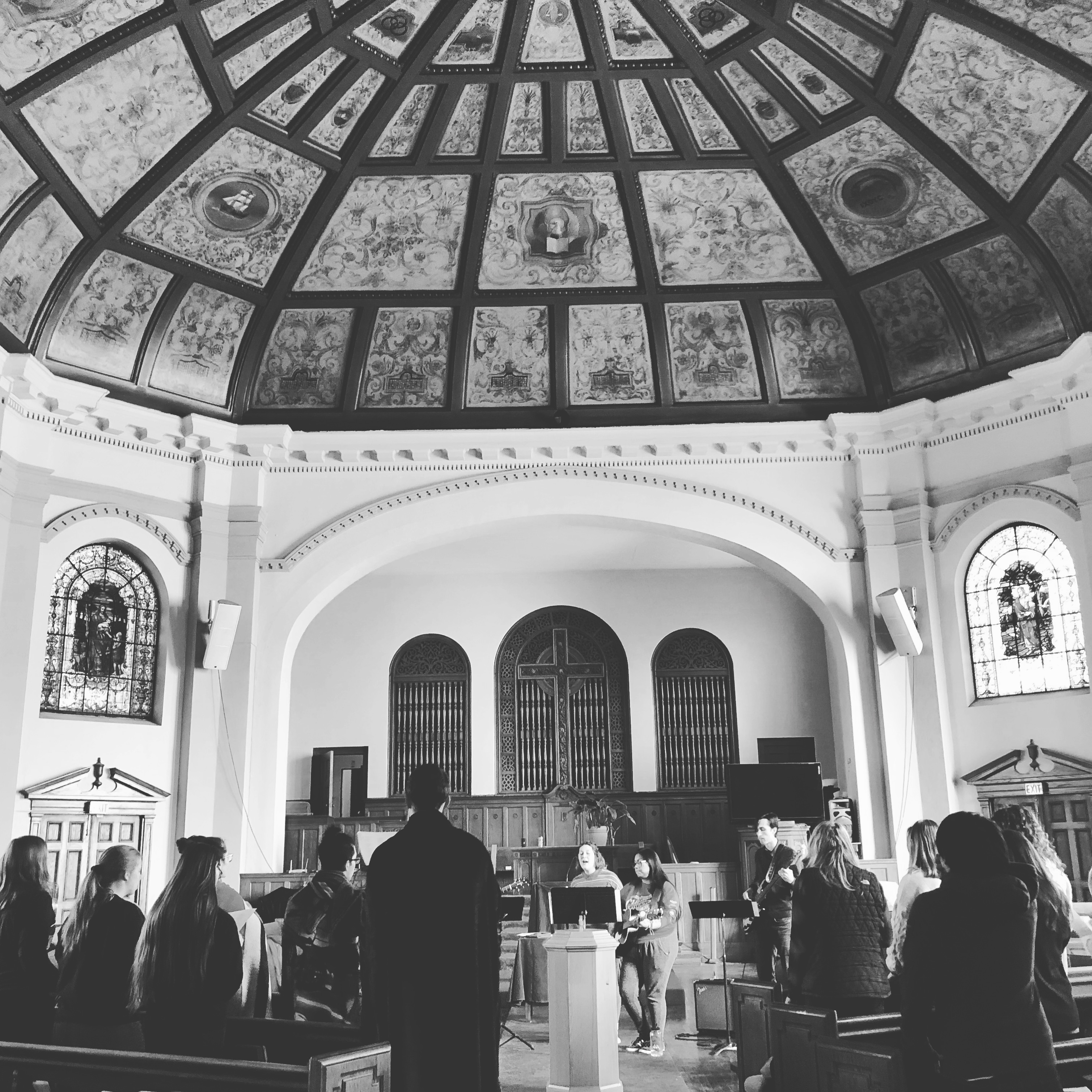Solo Marco Polo: Rose Rumery
Hello!
Hi!
What is your name?
Rose Rumery
What is your middle name?
Frances.
Is there a story there?
It’s kind of in the family. But also on my birth certificate it’s Rose Frances Challa Rumery. So I have my mom’s maiden name there, too.
Four names, like a British person.
Yeah, and I’m the only one who got Challa in there somehow.
Nice. So Rose, what’s some of the most interesting food you’ve made in the past two weeks?
With the help of Eden, we’ve made lots of interesting things- my favorite being our sweet potato tacos. We always have some guace, some spicy sweet potatoes, and we added some bacon, and jalapenos- those are my favorites. We also bake a lot of things, whether it’s bread or pretzels or cookies.
If someone wanted to find these recipes, are they available?
Well, we do have an Instagram you can follow. Also, trying to convince Eden to make a cookbook- that would be fun. But, you can always hit me up for a fast recipe.
What’s the name of the Instagram account?
I think it’s @edenroseeatz, which I have been told should be changed to “@edencooksroseeatz”
(short intermission where we comment on finding a single child’s shoe during our walk)
So, how did you find Agape+Ecclesia?
I think I went to FaithFest- I knew I wanted to get involved right away as a freshman, so I know I went there and tried out an Agape right away.
Do you remember the first person you met?
I do not- I do remember there being a lot of people. It was in Damen Den. I met a lot of people because I was a freshman. I specifically remember being overwhelmed because it was a lot of people, leaving quickly, and forgetting my water bottle which is a classic Rose move. So I waited out in Damen until I thought everyone had left, and then I went back and of course, Mike Moore was still there. We had a conversation where I was like “okay, he seems pretty chill.”
What would you say draws you into the community?
I think the authentic relationships. Everyone is really different, which is really cool; it’s not just one culture of people, or some classic Christian culture. I think we bring lots of different backgrounds and experiences. Even just our student personalities are different around the board, and so its fun to come together and have something that unites us in that way.
Do you remember how you became a Christian?
I grew up in the church, and- it was a Catholic church, and I would always play the bells in the choir and cute things like that. I remember not really understanding what a relationship with Jesus was until middle school. I went to camp- Camp Geneva. That was a turning point in my faith, just realizing “oh, this isn’t just a Sunday tradition, but something that I can let drive my life.”
What draws you to Jesus?
This is a tough question, but I’d say just the way that he acts in relationships. How he sees the people who aren’t seen, and is always uplifting the broken and marginalized. That’s a really cool thing to see in what we consider the person to worship in our faith. That’s very different from a lot of the people in power. Just that relationship thing, again.
Do you remember the last time you laughed really loud?
I feel like I laugh a lot, but specifically me and my cousin Josie will send Marco Polo videos to each other, and we will just cry-laugh over video to each other. She has such a contagious laugh. So technically I’d be alone laughing hysterically, but it’s been fun and cool to still have those conversations and a relationship with her.
What breaks your heart?
I think it’s probably hate in general- whenever I have friends who are hurt by hate and when I see it in the world. It makes me really sad to have division in any way, and have those things driven by human prejudice and hate. It doesn’t make sense and it wouldn’t make sense to anybody if you knew these people had that real love for people, so that breaks my heart.
What gives you hope?
So many things- especially lately, I’ve seen hope in a lot of places, but something I’ve come back to is how I see God in nature and in the ways that He has created this earth and sustains it. You can just look anywhere, whether in an animal or plant or tree, and see how there is resilience in them. I look at them and think “wow, we are loved even more than that” and are created even more resilient than that.
I like that word “resilience”. So, what is keeping you sane, or resilient, in COVID-19?
I think I’ve been findinga lot of fun outlets- I’ve gotten back into running some longer miles since I have the time. Also getting to see different parts of the neighborhood. Doing a lot of art again- getting back into things that I’ve missed doing. I also like to write letters to people.
Is there a book or piece of art or podcast or music that you think everyone should experience?
I feel like I could do a whole talk just on this, but, I really love Mary Oliver- she writes some amazing poems. I would look into her writing, because it’s really beautiful- it’s spiritaully driven but she writes a lot about nature, too.
What’s one piece of advice you would give to folks listening?
I would say, just really try to fight the culture of college. It’s really worth it to try to be present and to combat the culture of anxiety. That’s something that I’ve thought all throughout college. I want to remember the little moments rather than how hard I prepared for my future. We all know that, as hard as we’ve prepared, those things can be ripped out beneath us.
//
Eggs and Bunnies Taste Better: Jeffrey Lillard
Hello!
Hi.
What is your name?
Jeffrey Michael Lillard the 1st.
The first of his name.
Well, probably not.
Are you much of an Easter candy guy?
Yeah, I think so- my favorites are Reese’s. They taste better when they’re in egg form or bunny form. I guess that’s the go to, as well as, what are they called, Canterbury?
Cadbury.
Cadbury! Those are good as well.
When did you find Agape+Ecclesia?
I found A+E over the summer before I transferred- I was looking on the Loyola campuis ministry website. I think that was the time I was getting into greek words and Christianity, so I saw Agape and I don’t know where I went from there- I just remember getting put on the Facebook page before the semester started. I remember meeting (Tyler) and Alec and Faith Fest. I’d reached out to you, but I can’t remember what I said.
What draws you into the community?
Very energetic, passionate, loving, affirming. That’s what I really remember. My first Agape was weird. People were so nice and friendly; I remember Joshua Webb and Krista Smith. The significant moments in that first Agape were where I noticed “these people really care about me and want me here.” I think that continues to draw me in, as well. Because that drew me in, it made me want to have more of an impact on these other people like they did for me.
Why are you a Christian?
I am convinced that Jesus Christ is pretty cool; utterly amazing. And that giving him my life and following him is worth every bit of it. I have been convicted of that.
What draws you to Jesus?
His compassion; his love for all people, for people who I have a hard time loving. His teachings, his parables are amazing. His passion, of course, is remarkable- the way he fulfilled this amazing narrative that we find in the Bible. It’s hard to ignore.
What gives you hope?
An easy Christian answer would be Jesus and what he did on the cross. His victory over death is pretty hopeful for all of us.
What did he do on the cross that we couldn’t do for ourselves?
He took on sin and he bore our sin. Even saying that sounds very theological so I want to explain it better- he took the punishment that we deserved because we’ve all done pretty awful things. That unfortunately deserves a punishment that we aren’t able to bear, and that God doesn’t want us to bear. So he his son to bear that for us.
What has God done for you that you couldn’t do for yourself?
I think he’s given me hope; I can’t give myself hope. I’ve had points where I feel hopeless in my own abilities. Jesus’ love and his reaching out to me at my lowest and most in despair moments, he’s given me hope that I never could have gotten for myself.
Is there a book that you think everyone should read or an album they should listen to? I know you’re a book guy and a music guy, but I feel like people know less about your music guy side.
Yeah, can I do both?
Sure.
Album is tricky- I’d have to go with a King’s Kaleidoscope album, but which one? I might have to do Zeal or Becoming Who We Are. I have too many books, but one book that everyone should read? I’ll say Screwtape Letters by C.S. Lewis.
What do you love about it?
The humor strikes me at the same time as the power and importance of the topic. There is such a heaviness to every part of that book. To be able to listen to what the devil wants you to think is pretty powerful, but you can find yourself having these “aha!” moments and saying “oh that makes sense.” A lot of feelings.
What words of wisdom would you give to yourself from three years ago when you were starting Loyola?
I think I was trying very hard to be someone; I was sort of in a hurry to become someone that I thought I wanted to be, but really I had no idea. I didn’t even know why. I would tell myself to not be in such a hurry to become someone that you think you want to be, because you’re probably gonna find out that that person isn’t what you want. My advice would be to take the future person you want to be to God and give that over to him- not think about it too much, but think about the present and how you can become more Christlike.









